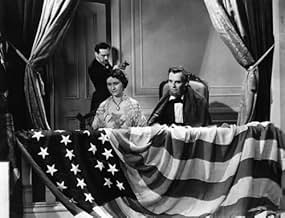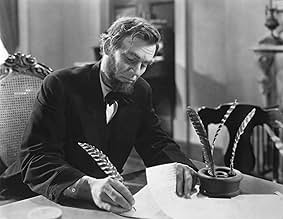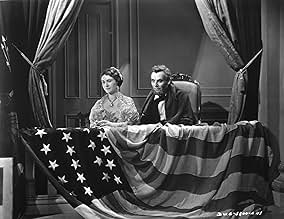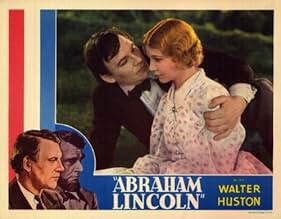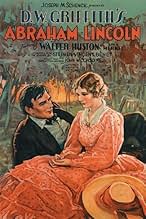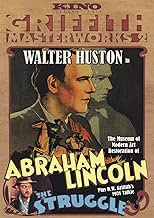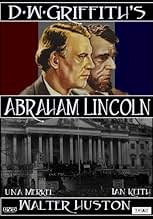IMDb RATING
5.7/10
1.8K
YOUR RATING
An episodic biography of the 16th President of the United States.An episodic biography of the 16th President of the United States.An episodic biography of the 16th President of the United States.
- Awards
- 4 wins total
William L. Thorne
- Tom Lincoln
- (as W.L. Thorne)
Edgar Dearing
- Armstrong
- (as Edgar Deering)
Jason Robards Sr.
- Herndon
- (as Jason Robards)
Cameron Prud'Homme
- John Hay - Secretary to the President
- (as Cameron Prudhomme)
James Eagles
- Young Soldier
- (as Jimmie Eagle)
Featured reviews
I think it qualifies as a must-see film for all true scholars of the cinema. That is not to say that it is a good film. It is most certainly not. But this is really a perfect film in which to study the biggest change that this artistic medium ever experienced, the change from silence to sound. The whole film comes off as so, so awkward. It doesn't help that the script is awful. The film is actually over-ambitious, trying hard to cover the entire life of Abe, from birth to death. However bad Abraham Lincoln is, though, I myself found it more than watchable and always fascinating. 6/10.
ABRAHAM LINCOLN (United Artists, 1930), directed by movie pioneer D.W.
Griffith, is an interesting antique, being Griffith's first of two
ventures in talking pictures.
This movie about an American president is more of Griffith's style, in spite that his technique in movie directing has become passé since the start of the roaring twenties. Handicapped by its slow pacing, Walter Huston gives a very fine performance in his title role, with Kay Hammond somewhat satisfactory as his wife and later first lady, Mary Todd Lincoln, along with Ian Keith adding fine support with his few scenes as John Wilkes Booth, a crazed stage actor who puts an end to Lincoln's life on that tragic day of April 14, 1865. However, it is Una Merkel as Ann Rutledge, Lincoln's true love interest in the early portion of the story, whose performance weakens the film. This capable actress might have made a go with her role if it weren't for some bad dialog she recites, such as responding to Lincoln following his proposal to her, "Yes, Abe. You've got your gingerbread." Then there are Griffith screen veterans of the silent era, Henry B. Walthall as Colonel Marshall; Hobart Bosworth as General Robert E. Lee; and the great character actress, Lucille LaVerne, the spiteful old hag in ORPHANS OF THE STORM (1921) appearing in an opening scene as Mrs. Lincoln's midwife. Her raspy voice fits her personality to a "T".
With the screenplay by Stephen Vincent Benet, this epic biography with episodic events opens with the birth of a great man, Abraham Lincoln, on February 12, 1809. Moments later viewers find the infant now "the ugliest and smartest man in New Salem" clerking at Denton Offut's general store, his romance with young Ann Rutledge who later dies, and functioning as a young lawyer. After he meets Mary Todd at a society ball, the scene shifts to Lincoln as a bridegroom having second thoughts about attending his own wedding. He eventually marries her. Move forward to the 1860 Lincoln-Douglas (E. Alyn Warren) debate, which, as seen on screen, is not much of a debate but just two participants delivering a few words of dialog each. Lincoln wins the presidency and is soon faced with his long battle with the Civil War and placing Colonel Ulysses S. Grant (Fred Warren) in charge to put an end to it. After the end of the war, 1865, Lincoln wins his second term election, but doesn't live to fulfill it.
Originally released in theaters at 97 minutes, ABRAHAM LINCOLN in recent years has become a public domain title distributed by various video companies, most presenting bad copies with shorter lengths, many cut down to about 84 minutes, some eliminating scenes with Lincoln heading over towards the cemetery during a thunder storm crying over Ann's grave; another involving Lincoln tender moments with his youngest son, Tad (Gordon Thorpe). After coming across these inferior copies in video stores, I've managed to locate an excellent and more accurate video copy in 1986, compliments of Blackhawk Video. Not only was the video print clear in both visuals and sound, it included restored events eliminated from reissue copies, the ones that had played on Arts and Entertainment channel, Turner Classic Movies (where it made its debut March 8, 2007) and many public television stations during the late night hours. Reissue prints begin with a view of a log cabin and sound track of whistling winds superimposed with the title of February 12, 1809. In the nearly restored 93 minute video copy, it begins with a five minute prologue done in the silent film tradition showing slaves being shipped to the United States followed by other historic events and conversations amongst various politicians (one of them played by Henry Kolker), before shifting towards the event of Lincoln's birth in a log cabin. There are other silent sequences interacted into the story later on, as well as some off screen singing in the sound track not shown in the edited versions.
It's been said that ABRAHAM LINCOLN was a financial and critical success upon release. By today's standards, it hasn't stood the test of time. Future retelling on Lincoln's life, YOUNG MR. LINCOLN (1939) with Henry Fonda, and ABE LINCOLN IN ILLINOIS (1940), with Raymond Massey, are both excellent in their own way and continue to hold interest. However, Griffith's adaptation is the only one of the three mentioned to focus on the Civil War. Regardless of its handicaps, Griffith's first talkie on the life of Lincoln has some interesting moments, but otherwise it's a rather dull affair. Worth viewing for history buffs, but aside from Lincoln's frequent remark, "The union must be preserved," don't expect an accurate history lesson out of this. (**1/2)
This movie about an American president is more of Griffith's style, in spite that his technique in movie directing has become passé since the start of the roaring twenties. Handicapped by its slow pacing, Walter Huston gives a very fine performance in his title role, with Kay Hammond somewhat satisfactory as his wife and later first lady, Mary Todd Lincoln, along with Ian Keith adding fine support with his few scenes as John Wilkes Booth, a crazed stage actor who puts an end to Lincoln's life on that tragic day of April 14, 1865. However, it is Una Merkel as Ann Rutledge, Lincoln's true love interest in the early portion of the story, whose performance weakens the film. This capable actress might have made a go with her role if it weren't for some bad dialog she recites, such as responding to Lincoln following his proposal to her, "Yes, Abe. You've got your gingerbread." Then there are Griffith screen veterans of the silent era, Henry B. Walthall as Colonel Marshall; Hobart Bosworth as General Robert E. Lee; and the great character actress, Lucille LaVerne, the spiteful old hag in ORPHANS OF THE STORM (1921) appearing in an opening scene as Mrs. Lincoln's midwife. Her raspy voice fits her personality to a "T".
With the screenplay by Stephen Vincent Benet, this epic biography with episodic events opens with the birth of a great man, Abraham Lincoln, on February 12, 1809. Moments later viewers find the infant now "the ugliest and smartest man in New Salem" clerking at Denton Offut's general store, his romance with young Ann Rutledge who later dies, and functioning as a young lawyer. After he meets Mary Todd at a society ball, the scene shifts to Lincoln as a bridegroom having second thoughts about attending his own wedding. He eventually marries her. Move forward to the 1860 Lincoln-Douglas (E. Alyn Warren) debate, which, as seen on screen, is not much of a debate but just two participants delivering a few words of dialog each. Lincoln wins the presidency and is soon faced with his long battle with the Civil War and placing Colonel Ulysses S. Grant (Fred Warren) in charge to put an end to it. After the end of the war, 1865, Lincoln wins his second term election, but doesn't live to fulfill it.
Originally released in theaters at 97 minutes, ABRAHAM LINCOLN in recent years has become a public domain title distributed by various video companies, most presenting bad copies with shorter lengths, many cut down to about 84 minutes, some eliminating scenes with Lincoln heading over towards the cemetery during a thunder storm crying over Ann's grave; another involving Lincoln tender moments with his youngest son, Tad (Gordon Thorpe). After coming across these inferior copies in video stores, I've managed to locate an excellent and more accurate video copy in 1986, compliments of Blackhawk Video. Not only was the video print clear in both visuals and sound, it included restored events eliminated from reissue copies, the ones that had played on Arts and Entertainment channel, Turner Classic Movies (where it made its debut March 8, 2007) and many public television stations during the late night hours. Reissue prints begin with a view of a log cabin and sound track of whistling winds superimposed with the title of February 12, 1809. In the nearly restored 93 minute video copy, it begins with a five minute prologue done in the silent film tradition showing slaves being shipped to the United States followed by other historic events and conversations amongst various politicians (one of them played by Henry Kolker), before shifting towards the event of Lincoln's birth in a log cabin. There are other silent sequences interacted into the story later on, as well as some off screen singing in the sound track not shown in the edited versions.
It's been said that ABRAHAM LINCOLN was a financial and critical success upon release. By today's standards, it hasn't stood the test of time. Future retelling on Lincoln's life, YOUNG MR. LINCOLN (1939) with Henry Fonda, and ABE LINCOLN IN ILLINOIS (1940), with Raymond Massey, are both excellent in their own way and continue to hold interest. However, Griffith's adaptation is the only one of the three mentioned to focus on the Civil War. Regardless of its handicaps, Griffith's first talkie on the life of Lincoln has some interesting moments, but otherwise it's a rather dull affair. Worth viewing for history buffs, but aside from Lincoln's frequent remark, "The union must be preserved," don't expect an accurate history lesson out of this. (**1/2)
This being a presidential election year made me curious about this early talkie. I had seen it before but it's been a while and so I wanted to actually go through a diagnosis of the movie itself. So I dragged out an old A&E VHS made copy. Griffith had tackled the Booth assassination of Lincoln before in the silent Birth of A Nation. Here he did it in sound and Ian Keith is great as John Wilkes Booth: "S-I-C T-E-M-P-E-R T-Y-R-A-N-N-I-S... As he yells after he shoots Lincoln at Ford's theatre and jumps onto the stage. And Walter Huston is much more Lincolnesque than Henry Fonda would be ten years later. Also the scene where Lincoln & U.S. Grant are conversating over cigars was kind of priceless. Una Merkel is compelling in an early film performance as Lincoln's first wife Ann Rutledge.
This was Griffith's first sound film and he shows a somewhat uneasiness with the new medium but what director didn't in 1930. Griffith faired better than most. If you can look past the oldness of the film you'll see that this is pretty much a straight forward & accurate & well made(by 1930 standards) telling of the events of Lincoln's life. The sort of way Masterpiece Theatre would later tell stories episodically over many hours decades later. Griffith shows an aptitude for shooting that had already happened in the late silents of Hollywood. He makes quality use of the moving camera. Roving in and out of some scenes. The shot where the soldiers are fighting in trenches during the Civil War are similar to the same kind of shot Lewis Milestone did in All's Quiet On the Western Front which also came out in 1930. But even both of these films hark back to Griffith's own scene in Birth of A Nation where the South is battling the North and the Colonel jumps out of the trench to stoke a cannon.
This was not Griffith's first experiment with sound. He had shot some experimental dialogue scenes for his 1921 feature Dream Street. A short 1921 intro to Dream Street with Griffith talking up the film still exists as well as a 1930 sitdown interview with Huston promo-ing Abraham Lincoln. But Abraham Lincoln showed a 'newer' Griffith. Moving away from the static camera of which he was famous and adopting a more fluid style which was recently introduced by some German directors. Griffith even this late still liked old fashioned 19th century melodrama stories. Lincoln's life story is certainly a subject he could sink his teeth into. He had done bits and parts of Lincoln's life before particularly the Ford's Theatre scene in BoAN. Abraham Lincoln is Not necessarily a great film nor the best of 1930 but a very interesting foray into sound by a great film pioneer and like mentioned before a lot of the Lincoln life is covered quite surprisingly well.
This was Griffith's first sound film and he shows a somewhat uneasiness with the new medium but what director didn't in 1930. Griffith faired better than most. If you can look past the oldness of the film you'll see that this is pretty much a straight forward & accurate & well made(by 1930 standards) telling of the events of Lincoln's life. The sort of way Masterpiece Theatre would later tell stories episodically over many hours decades later. Griffith shows an aptitude for shooting that had already happened in the late silents of Hollywood. He makes quality use of the moving camera. Roving in and out of some scenes. The shot where the soldiers are fighting in trenches during the Civil War are similar to the same kind of shot Lewis Milestone did in All's Quiet On the Western Front which also came out in 1930. But even both of these films hark back to Griffith's own scene in Birth of A Nation where the South is battling the North and the Colonel jumps out of the trench to stoke a cannon.
This was not Griffith's first experiment with sound. He had shot some experimental dialogue scenes for his 1921 feature Dream Street. A short 1921 intro to Dream Street with Griffith talking up the film still exists as well as a 1930 sitdown interview with Huston promo-ing Abraham Lincoln. But Abraham Lincoln showed a 'newer' Griffith. Moving away from the static camera of which he was famous and adopting a more fluid style which was recently introduced by some German directors. Griffith even this late still liked old fashioned 19th century melodrama stories. Lincoln's life story is certainly a subject he could sink his teeth into. He had done bits and parts of Lincoln's life before particularly the Ford's Theatre scene in BoAN. Abraham Lincoln is Not necessarily a great film nor the best of 1930 but a very interesting foray into sound by a great film pioneer and like mentioned before a lot of the Lincoln life is covered quite surprisingly well.
... "personally directed" by D. W. Griffith. Walter Huston stars as Lincoln, shown from his birth through his rough-and-tumble early years, his doomed romance with Ann Rutledge (Una Merkel), his marriage to the eccentric Mary Todd (Kay Hammond), and his election to the presidency, where he presided over the U. S. Civil War, during which he wrote the Emancipation Proclamation freeing the slaves, before being felled by an assassin's bullet.
Like most of Griffith's movies, this is a mixed bag of interesting choices, corny populism, and a rose-colored vision of the past. I was surprised by the opening of the film, set aboard a trans-Atlantic slave ship, featuring slave traders coldly discussing their remaining "inventory" as they toss a dead African overboard. As this was one of a few scenes missing its audio, I have a feeling it was often cut out during exhibition.
I was confused by Griffith's decision to cast E. Alyn Warren as both Stephen Douglas and Ulysses Grant: were there not enough qualified actors around? I liked seeing silent film stalwarts Hobart Bosworth and Henry B. Walthall as General Robert E. Lee and his attendant colonel, respectively. I liked Walter Huston as Honest Abe, and was surprised by how much he looked like the photographs of Lincoln in the last third of the film.
The biopic elements themselves are simplistic and hagiographic, and things seemed rushed, trying to tell his entire life story in 90 minutes. I was not a fan of Hammond as Mary Todd, and felt she dragged the proceedings down quite a bit.
Like most of Griffith's movies, this is a mixed bag of interesting choices, corny populism, and a rose-colored vision of the past. I was surprised by the opening of the film, set aboard a trans-Atlantic slave ship, featuring slave traders coldly discussing their remaining "inventory" as they toss a dead African overboard. As this was one of a few scenes missing its audio, I have a feeling it was often cut out during exhibition.
I was confused by Griffith's decision to cast E. Alyn Warren as both Stephen Douglas and Ulysses Grant: were there not enough qualified actors around? I liked seeing silent film stalwarts Hobart Bosworth and Henry B. Walthall as General Robert E. Lee and his attendant colonel, respectively. I liked Walter Huston as Honest Abe, and was surprised by how much he looked like the photographs of Lincoln in the last third of the film.
The biopic elements themselves are simplistic and hagiographic, and things seemed rushed, trying to tell his entire life story in 90 minutes. I was not a fan of Hammond as Mary Todd, and felt she dragged the proceedings down quite a bit.
This film was to be D.W. Griffith's big comeback production, and it did very well for "the old master." In fact, it was chosen as number two of the Ten Best Pictures of 1930 by The Film Daily, just below "All Quiet On The Western Front!" Sadly, due to the horrible condition of the available prints of this film, no really fair analysis can be made today. As with so many early talkies, Abraham Lincoln is now a sickly shadow of what it was in 1930. To begin with, it's original running time is listed at approximately 96 minutes. The version presented on Laserdisc runs 83 minutes.The film shows signs of wear and duping. The soundtrack is horribly distorted and, in several scenes, seems to be missing totally, replaced by terrible music from a stock library. Even so, if one can look past these things and take the acting style in the context of its time, one can see that Griffith had not lost his flair and would have probably continued directing had the fates (and probably Hollywood) not conspired against him. There are wonderful cinematic moments, reminiscent of some of his earlier triumphs. This is a film that cries out for restoration but, alas, there is most likely little or nothing left to restore. UPDATE: In 2008, KINO International released a DVD version of Abraham Lincoln that is far more complete than the old Laserdisc I reviewed from in 1998. While some soundtrack from the Prologue is still missing, KINO has made up for it by adding subtitles for the missing dialogue. Also, the picture quality is far superior to anything else available. It is evident that much effort went into making this forgotten film much more watchable and available!
Did you know
- TriviaThis was D.W. Griffith's first sound film. La révolte des esclaves (1930) was also the first sound film about the Civil War which veterans of that war could view.
- GoofsIn both the Union and Confederate parades, the musicians play trombones with forward facing bells. During the Civil War, the bells faced backwards.
- Quotes
[death scene]
Ann Rutledge: I know the truth, dear. It's goodbye.
Abraham Lincoln: No, no, Ann, dear. You're not going to leave me. I won't let you!
Ann Rutledge: We must be brave, dear...
[looking up to the heavens]
Ann Rutledge: Don't take me away. Don't take me away! It's so dark and lonesome!
Abraham Lincoln: Ann, you mustn't let go.
Ann Rutledge: If they'd sing, I wouldn't be so afraid.
[a chorus of "Sweet By and By" swells up in the background]
Ann Rutledge: We will meet there, dear.
- Alternate versionsOriginally, this film was color-tinted in sepia-tone, with blue for night scenes. These prints also had a prologue. Current public-domain prints are in black and white, minus the prologue with a shorter running time.
- ConnectionsEdited into General Spanky (1936)
- SoundtracksBattle Hymn of the Republic
(ca 1856) (uncredited)
Music by William Steffe
Lyrics by Julia Ward Howe (1862)
Played during the opening credits and often in the score
Sung by an offscreen chorus during a civil war scene
- How long is Abraham Lincoln?Powered by Alexa
Details
- Runtime
- 1h 36m(96 min)
- Color
- Aspect ratio
- 1.20 : 1
Contribute to this page
Suggest an edit or add missing content

